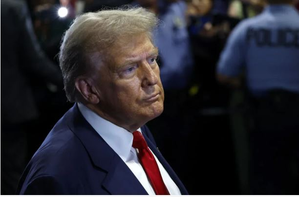America
Trump asks appeals court to transfer hush money case to federal jurisdiction.

October 15,
Attorneys for Donald Trump sought to have the case that had previously resulted in his conviction in a New York state court for charges related to concealing hush money given to a porn star transferred to federal court. This would allow Trump to terminate the prosecution in the event that he were to recover the president.
As part of their appeal from U.S. District Judge Alvin Hellerstein's decision on September 3 to reject the transfer to federal court, his attorneys re-filed the request with the 2nd U.S. Circuit Court of Appeals in Manhattan. In May, a jury found Trump guilty on 34 charges of document fraud.
In their brief, Trump's legal team referenced the July 1 ruling by the U.S. Supreme Court that ex-presidents are immune from prosecution for official acts done while in office. They contended that the jurors in the hush money case had been shown evidence of Trump's official conduct as president in an unlawful manner.
His legal team argued that the state charges violated the constitutional power of the president. On November 5, voters will choose between Democratic Vice President Kamala Harris and Trump, the Republican candidate. If he is elected, he will have the power to pardon himself for any federal offense or request that any federal criminal proceedings against him be dismissed by his new leadership at the Justice Department. Neither the president's pardon power nor the actions of the Justice Department can affect state criminal prosecutions.
U.S. law allows federal officials to be subject to criminal or civil proceedings in state court if such actions are deemed to be incidental to the performance of their official duties. Trump's legal team, including Emil Bove and Todd Blanche, claimed in a statement that the prosecution's "use of official-acts evidence in grand jury proceedings and at trial violated the Constitution and threatens the ability of all future Presidents to fulfill that role."
Trump was found guilty by a jury in May of tax evasion and obstruction of justice for his role in covering up the payment of US$130,000 made by his former lawyer Michael Cohen to Stormy Daniels, an adult film actress, in exchange for her quiet on a sexual encounter she said she had with Trump ten years prior. Democrat Alvin Bragg's office filed the action in Manhattan District Court.
The meeting with Daniels is something Trump disputes. Following his sentencing on November 26, he intends to file an appeal of the decision. Evidence of a former president's official acts cannot be utilized in criminal cases involving otherwise personal behavior, according to the Supreme Court's immunity ruling. This decision stems from an appeal connected to federal criminal charges against Trump, which were related to his attempts to reverse his 2020 election loss to Democrat Joe Biden.
The legal team representing Trump has claimed that the hush money case ought to be dropped due to the Supreme Court's ruling. In both the federal case involving the election and the Manhattan lawsuit, Trump entered a not guilty plea. Since the trial included "private, unofficial acts, outside the bounds of executive authority," Hellerstein rejected Trump's motion to transfer the hush money case to federal court.
Trump has the option to request that the Supreme Court, which is currently majority conservative with a 6-3 vote and includes three justices he appointed, review the case if the 2nd Circuit finds against him. A representative from Bragg's office was slow to react when asked for comment. The 2nd Circuit has yet to set a due date for Bragg's office to reply to the brief submitted by Trump.



































